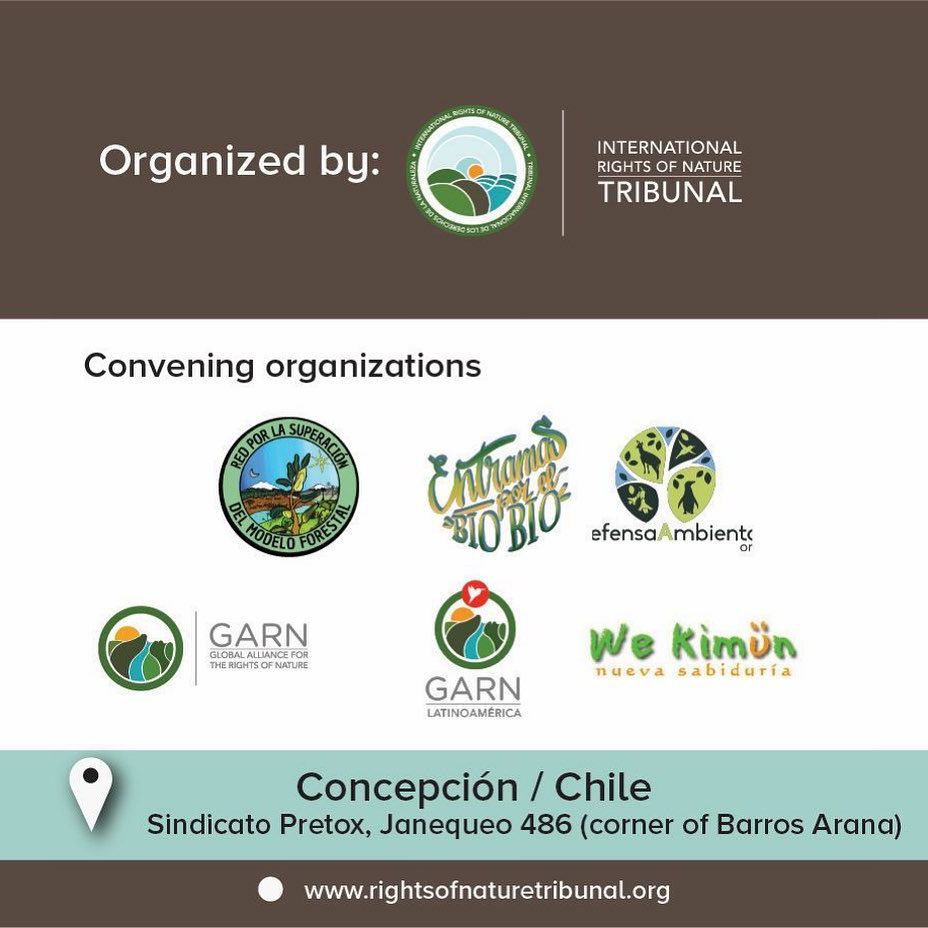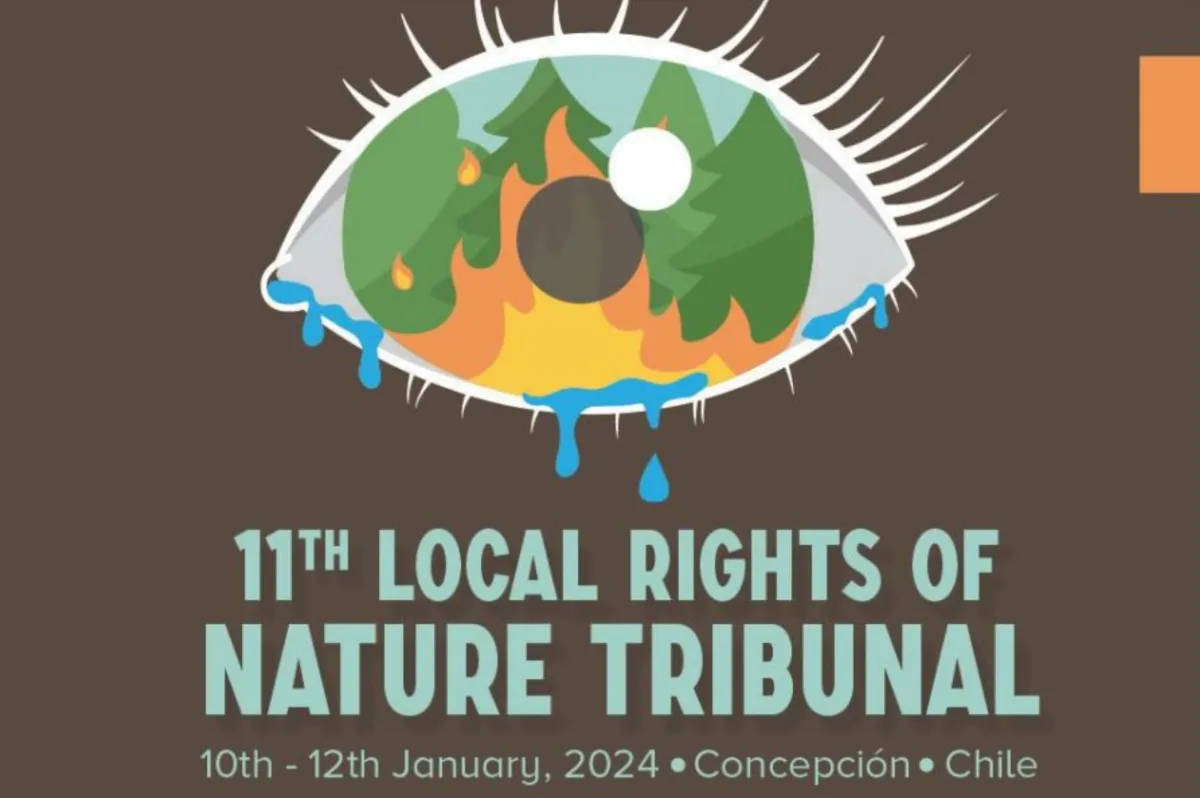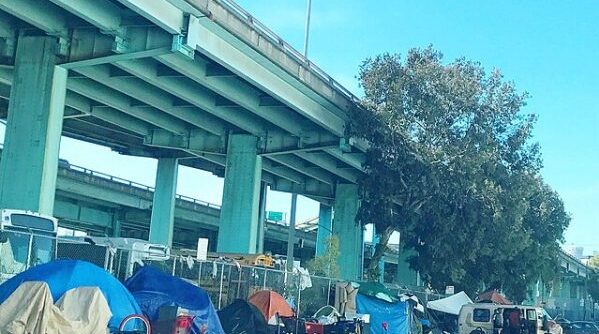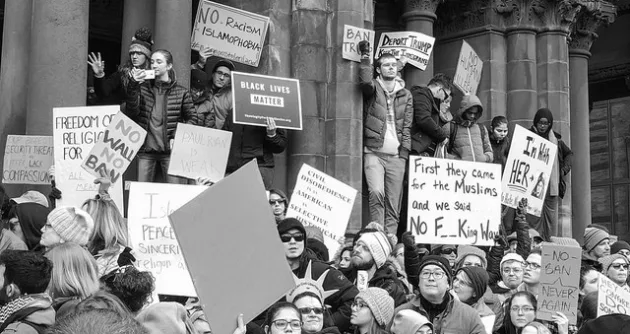Press release · 11th Local Rights of Nature Tribunal
Biobío, Concepción, Chile
International Rights of Nature Tribunal rules impacts caused by current forestry model as ecocide
The International Rights of Nature Tribunal held its 11th Local Tribunal in the Biobío region in Chile on Friday, January 12, focusing its attention on the violations of the Rights of Nature arising from the forestry model and the devastating forest fires of 2023.
Chaired by prominent environmental lawyer Enrique Viale and with the support of Earth Prosecutor Ricardo Frez, the Tribunal set out to investigate the responsibilities of public and private entities in implementing a destructive forestry model. The Tribunal had a panel of distinguished judges: Claudio Donoso (Chile), Antonio Elizalde (Chile), Jacqueline Arriagada (Chile), Lucio Cuenca (Chile), and Karina Riquelme (Chile).
On Thursday 11, the Tribunal was able to hold an in situ visit to the territory and toured Agua Amarilla, Coroney, Cerro Neuque, Bosque de Queules, in the commune of Tomé; and Patagual, Quetra, la Quebrada and the commune of Santa Juana, to talk with affected people, communities and neighborhood councils, learning about the monoculture tree plantations and seeing first-hand the impacts of the forestry model and the fires on the lives of people and Nature. They also visited a Queule reserve, where they could appreciate the resilience of this and other native trees such as the Quillay, which resisted the fire, as well as examples of sustainable forest management that protects small refuges of life.
During the session, the judges had the opportunity to hear moving testimonies and compelling evidence from experts, affected communities, and activists, reflecting the catastrophic impact of the forestry model on communities and the ecosystem. It was highlighted that the mega-fires of 2023 burned through more than 479,000 hectares, severely affecting 61% of the forest area and 9.4% of the total area of the region. These fires had a significant human cost, with more than 7,000 people affected, 26 fatalities, and the loss of 33,000 domestic animals.
The technical voice of representatives and researchers from EULA, NGO Conciencia Sur, and Earth Law Center was heard. In addition, members of communities and local organizations from Tomé, Patagual, Nacimiento, San Ramón-Quillón, and Santa Juana gave their testimonies, and the day closed with representatives of the Pewenche Indigenous Community of Alto Biobío, who recounted the pain and despair they feel at seeing their ancestral lands devastated, and how water contamination, loss of biodiversity, and territorial displacement have significantly affected their life systems, culturally affecting their roots and spirituality.
Experts in ecology and environmental sciences presented alarming data on the degradation of ecosystems due to forestry operations in the territory. They described evidence of the loss and contamination of water, affectation and critical loss of relevant species of flora and fauna, and, in general, the direct consequences of intensive forestry exploitation. At the same time, the imperative need to reevaluate the use of agrochemicals, deforestation, and monoculture practices was addressed.
After an exhaustive analysis, the judges issued strong statements. Forestry companies such as Arauco and CMPC, Chile’s largest, were singled out as responsible for such environmental destruction, and for compromising the fundamental rights of local communities. The Secretariat of the Tribunal invited the following institutions and companies to make an appearance before the Tribunal: CORMA, CONAF, ARAUCO (owner of the M.A.P.A. project), and CMPC (owner of the Santa Fe Plant project), who did not attend the hearing. An important presentation was made by the Mayoress of Santa Juana, who spoke of the suffering of the inhabitants of her commune, the history of the installation of the Forestry model, and the complete abandonment of the central government to mitigate and prevent these disasters.
In addition, an urgent call was made to reform insufficient environmental legislation and establish policies prioritizing environmental and community justice, urging the Chilean authorities to recognize the intrinsic rights of Nature as set out in the Universal Declaration of the Rights of Mother Earth.
The historical consequences of the implementation of Decree-Law No. 701 were denounced and a proposal was made to modify Article 19 of Law No. 20,283, on “Native Forest Recovery and Forestry Promotion”, and that community science should contribute to understanding and protecting the affected territories and, in this way, promoting a system of restoration that respects local ecosystems.
Claudio Donoso, one of the Tribunal’s judges, said: “The intervention of the mountains and mountain ranges has seriously affected the water supply, creating an alarming shortage. We are observing an accelerated deterioration of the territory which, in turn, is causing serious impacts on local communities”.
Lucio Cuenca, for his part, denounced the influence of large forestry companies on politics and institutions, alleging that “there is a kind of capture by groups such as Arauco and CMPC, which have molded politics according to their interests”.
The Tribunal stressed the urgent need to rethink forestry policies in Chile, highlighting the demands of Indigenous and local communities who have directly suffered the devastating consequences of this model. Karina Riquelme, another critical voice of the Tribunal, said: “The communities have made complaints that have been ignored for years. It is time to act and deeply recognize their pain, which we have seen has had vital consequences”.
The judges of the International Rights of Nature Tribunal issued an oral verdict on Friday afternoon, January 12, in which they declared:
- That the current Chilean forestry model has provoked ecocide in the territory and against all living beings that inhabit it, human and non-human;
- That the forestry model violates the Rights of Nature and even the weak environmental protection regulations existing in the country;
- It has verified the absence of the Chilean State in the regulation and control of the existing regulations, which they also declared to be completely insufficient;
- That the actions of the large forestry companies violate the Rights of Nature;
- The State of Chile is urged to recognize the Rights of Nature in its internal regulations, as the only way for the survival of humanity and biodiversity, and to promote a plan to overcome the current forestry model;
- A plan of restoration and integral regeneration is urgently demanded, worked on with the communities and in the local territory;
- The declaration of a moratorium or prohibition of the establishment of invasive and pyrophyte species in the territory is demanded;
- It considers Queule, the Nahuelbuta mountain range, the Cayumanqui hill, and the Biobío river, among other elements of Nature, as subjects of inherent rights that are recognized and protected by the Universal Declaration of the Rights of Mother Earth, which must be recognized, guaranteed and respected by the State of Chile.
The initiative of the XI Local Tribunal in the Biobío case against the Forestry Model was organized by the International Rights of Nature Tribunal and convened at the local level by the Alliance for the Rights of Nature of Biobío, composed of various organizations, including Red por la Superación del Modelo Forestal, Entramas por el Biobío, NGO We Kimün and NGO Defensa Ambiental; and, at the international level, by the Global Alliance for the Rights of Nature (GARN).
View the original source here.




